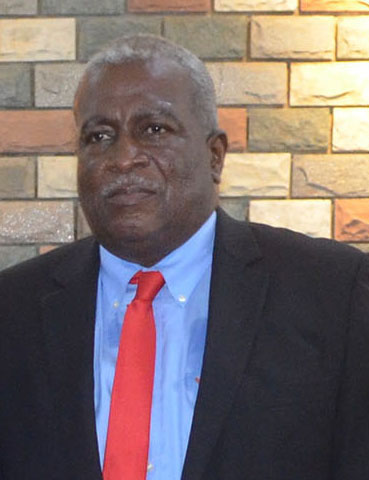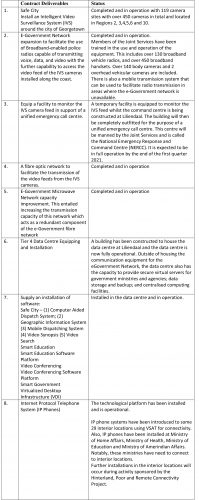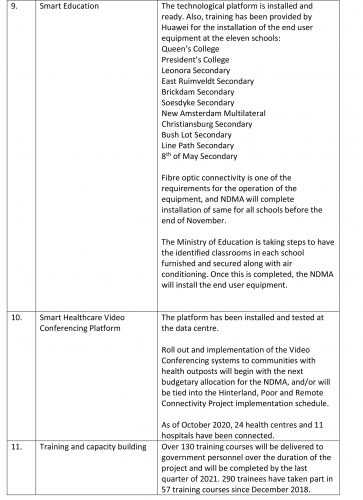The PPP/C government will continue with the China-funded US$37.6 million National Broadband Expansion Project to be implemented by Chinese firm Huawei and Prime Minister Mark Phillips said that national security considerations will be taken into consideration.
“Our current plan is to complete the implementation of the current broadband programme. As it pertains to future expansions, costs and funding those are matters that are still to be conceptualised and planned for in the near future,” Phillips told the Sunday Stabroek in an interview on Friday when asked for a status update on the project.
“To begin with, the project is funded through a loan from the Government of China. Any review of the broadband programme, especially as it pertains to Huawei’s continued involvement in the project will be objectively done by our technical staff taking into consideration our current ICT needs, and our national security considerations and concerns,” he added.
Huawei has been accused by the US and other western countries of acting as a proxy for Chinese security agencies with the potential for compromising national broadband systems and other sensitive infrastructure.
The US has been putting pressure on countries all over the world not to allow Huawei into their 5G networks. Just recently, Washington pressed Jamaica against entering such a relationship with Huawei.
In 2018, the APNU+AFC government signed a $37.6 million loan agreement with China for the broadband project, which was originally expected to have been completed by the end of this year.
Repayable over 20 years, with a five-year grace period at an interest rate of 2%, the monies were expected to finance and address existing gaps within the e-government network by improving the delivery of services to citizens in the areas of health, education, security and business and government administration.
Government then solicited the help of Chinese ICT giant Huawei Technologies to assist this country to expand its internet network so that connections could be available in remote parts of the country.
The Prime Minister explained, “The [Chinese Exim] Bank agreed to provide the Government an Interest-Subsidized Concessional Loan in the sum of Yuan 249,043,600 equivalent to G$7.563 billion. The purpose of this loan was to finance the commercial contract, which is Guyana National Broadband Contract… which was signed on 6th November 2017, between the then Ministry of Public Telecommunications of Guyana and the Huawei Technologies Co. Ltd for a total amount of US$37.600M.”
“The money was to be expended towards the, expansion and upgrading of the E-Government network to improve the efficacy of government services in the areas of smart government solutions, smart education, smart healthcare and a safe city solution. Also, the equipping of a data centre, the equipping of a unified emergency call centre and, training and human resource capacity building. The National Data Management Authority was mandated to facilitate the technical implementation of the Guyana National Broadband Contract on behalf of the Guyana Government, with Huawei Technologies being the turnkey supplier and installer,” he added.
But security concerns were raised and among them were the company’s access to advanced data systems here and the use of facial recognition technology in one component of the programme.
Phillips said that security concerns by the public have been heard and that measures would be put in place to guard against breaches, although he did not explain in detail how this would be done.
The Prime Minister nonetheless gave a status update on the project.
The following table below reflects the contract deliverables and the current status of the programme, according to the Phillips.
The Prime Minister, whose portfolio includes responsibility for the telecommunications and information sectors, along with elements of the energy sector, said that government understands the importance of information technology and bringing cheap expanded bandwidth to the people.
It is to this end that he reasoned that providing reliable and low cost internet connectivity was crucial, particularly amid the COVID-19 pandemic as virtual learning is now being done. This was one of the first undertakings of the PPP/C government and which saw a liberalising of the telecoms sector to fuse with the Broadband project and other planned technological programmes.
‘Best interest’
Of key focus for the rest of this year and into 2021 would be “increasing the available bandwidth and building the infrastructure for greater ICT connectivity especially to our remote, hinterland and rural communities [to] improve our E-health component”, he said.
“We have commenced work on a National ICT Strategic Plan, a multisectoral plan that will seek to deliver the strategic direction with regards to the ICT sector in Guyana. Through stakeholder engagements that will be conducted during the remainder of 2020, we will seek to identify the ICT needs and priorities. This will lead to us developing and designing a comprehensive system of initiatives and programmes that will look to transform Guyana from a traditional state to a digital one,” he said.
“Other projects are Data Protection Legislation and E-commerce Legislation (Review) as we seek to promote the use of ditigised documents by the government and the private sector. The focus of this project is to develop legislation on consumer and data protection, privacy, and access to information and data, cybercrime adoption, to name a few, which needs to be put in place to ensure institutional sustainability. Also, we will be collaborating with the Ministry of Tourism, Industry and Commerce to execute E-commerce awareness presentations. We will be working with the Ministry of Legal Affairs /Attorney General Chambers on the drafting of these legislations, and relevant stakeholders will be involved in this process,” he added.
He noted that with de-monopolisation comes the challenge of ensuring fair competition and no domination of the market and government will put measures in place, currently being outlined, on how this will be achieved.
Asked if government will be tied to the former monopoly holder, the Guyana Telephone and Telegraph for internet bandwidth provision or it will be purchased from other private providers, he said no decision has been made as yet to purchase bandwidth from other providers.”
He further said any future decision on purchase of bandwidth will be guided by what is best for the people we are providing the bandwidth to.
In relation to the public view that the de-monopolisation coincided with the preparedness of E-Networks to enter the market and asked how government will guard against political favouritism, he repeated, “We will be guided by what is in the best interest of the people of Guyana.”







